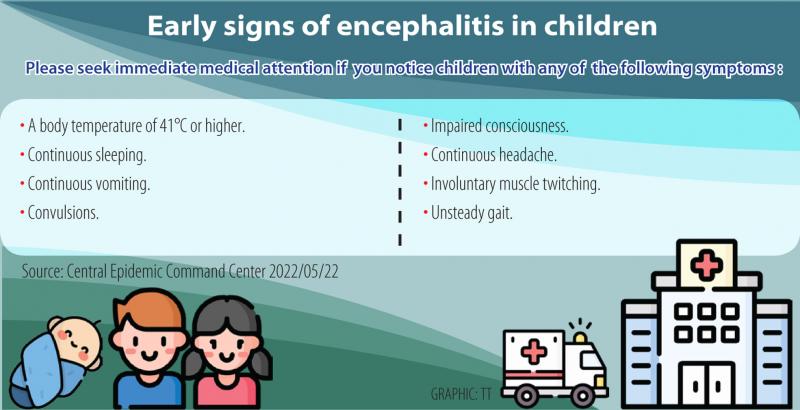People should look out for eight signs of acute encephalitis in children and seek emergency medical treatment if they occur, the Central Epidemic Command Center (CECC) said yesterday.
The symptoms are a body temperature of at least 41°C, impaired consciousness, excessive sleepiness, a persistent headache, vomiting, involuntary muscle twitching (myoclonic jerks), convulsions and an unsteady gait, said Centers for Disease Control Deputy Director-General Philip Lo (羅一鈞), deputy head of the CECC’s medical response division.
The symptoms were spelled out in the “Clinical Practice Guidelines for the Treatment of Acute COVID-19 Encephalitis in Children,” drawn up by members of the Taiwan Pediatric Association and other medical experts during a conference on Saturday, Lo said.

The number of children with COVID-19 developing acute encephalitis has been increasing amid Taiwan’s latest COVID-19 outbreak, Lo said.
People can develop a high fever due to an infection, but a fever of at least 41°C could signal a central nervous system disorder, he said, adding that people with impaired consciousness might even hallucinate.
“If parents notice the symptoms in their child, they should immediately seek medical attention, either by calling the 119 emergency hotline or taking their child to a hospital using private transport,” he said.
During enterovirus outbreaks, especially those involving the enterovirus 71 strain, cases of encephalitis in children have also increased, so people should watch for symptoms of other types of viral infections as well, he said.
Conference participants also discussed treatment methods for children with acute neurological emergencies, including increased intracranial pressure, COVID-19 infection and related immunotherapy, and epileptic seizure management, he said.
Lo said that 12 children have been diagnosed with severe COVID-19 so far this year, including five who developed encephalitis.
Four of the children with encephalitis are under the age of four, while the other case is a 10-year-old boy, reported yesterday, he said.
The boy does not have chronic health issues. He sought treatment at a clinic for a fever, dizziness and vomiting on May 13, and returned home to rest, he said.
He experienced impaired consciousness and muscle twitching the next day, and tested positive with a rapid COVID-19 test, Lo said.
He was taken to an emergency room and was found to have a fever of 40.1°C, mild pneumonia, brain edema, an irregular heartbeat, a low blood oxygen level and multiple organ dysfunction, Lo said.
The child was intubated and admitted to an intensive care unit for treatment, he added.

ALIGNED THINKING: Taiwan and Japan have a mutual interest in trade, culture and engineering, and can work together for stability, Cho Jung-tai said Taiwan and Japan are two like-minded countries willing to work together to form a “safety barrier” in the Indo-Pacific region, Premier Cho Jung-tai (卓榮泰) yesterday said at the opening ceremony of the 35th Taiwan-Japan Modern Engineering and Technology Symposium in Taipei. Taiwan and Japan are close geographically and closer emotionally, he added. Citing the overflowing of a barrier lake in the Mataian River (馬太鞍溪) in September, Cho said the submersible water level sensors given by Japan during the disaster helped Taiwan monitor the lake’s water levels more accurately. Japan also provided a lot of vaccines early in the outbreak of the COVID-19 pandemic,

Kaohsiung Mayor Chen Chi-mai (陳其邁) on Monday announced light shows and themed traffic lights to welcome fans of South Korean pop group Twice to the port city. The group is to play Kaohsiung on Saturday as part of its “This Is For” world tour. It would be the group’s first performance in Taiwan since its debut 10 years ago. The all-female group consists of five South Koreans, three Japanese and Tainan’s Chou Tzu-yu (周子瑜), the first Taiwan-born and raised member of a South Korean girl group. To promote the group’s arrival, the city has been holding a series of events, including a pop-up

TEMPORAL/SPIRITUAL: Beijing’s claim that the next Buddhist leader must come from China is a heavy-handed political maneuver that will fall flat-faced, experts said China’s requirement that the Dalai Lama’s reincarnation to be born in China and approved by Beijing has drawn criticism, with experts at a forum in Taipei yesterday saying that if Beijing were to put forth its own Dalai Lama, the person would not be recognized by the Tibetan Buddhist community. The experts made a remarks at the two-day forum hosted by the Tibet Religious Foundation of His Holiness the Dalai Lama titled: “The Snow Land Forum: Finding Common Ground on Tibet.” China says it has the right to determine the Dalai Lama’s reincarnation, as it claims sovereignty over Tibet since ancient times,

Temperatures in some parts of Taiwan are expected to fall sharply to lows of 15°C later this week as seasonal northeasterly winds strengthen, the Central Weather Administration (CWA) said today. It is to be the strongest cold wave to affect northern Taiwan this autumn, while Chiayi County in the southwest and some parts of central Taiwan are likely to also see lower temperatures due to radiational cooling, which occurs under conditions of clear skies, light winds and dry weather, the CWA said. Across Taiwan, temperatures are to fall gradually this week, dropping to 15°C to 16°C in the early hours of Wednesday